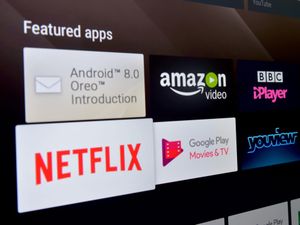Streaming review launched amid fears ‘vulnerable’ could be left behind
In 2023, 87% of UK households had access to an internet-enabled primary TV.

A review has been launched into the the future of linear TV as streaming and on-demand platforms drive the growth in online viewing.
A Future of TV Distribution report predicted that by 2040, 95% of UK households will be able to watch TV on the internet which, according to campaigners, could leave behind the “vulnerable” who cannot afford smart sets.
Researchers at the University of Exeter and others, commissioned by the Department for Culture, Media and Sport (DCMS), said 1.5 million people would be left with only having access to conventional linear broadcasting in the next 16 years.
The team looked at the trends after finding in 2023 that 87% of UK households had access to an internet-enabled primary TV, and 18% used the internet exclusively to watch television programmes.
The Broadcast 2040+ campaign is calling on the Government to ensure people are not left behind as habits change.
Elizabeth Anderson, chief executive of the Digital Poverty Alliance, a new Government forum which is a member of the campaign, said: “There are millions of people who rely on terrestrial TV to stay informed, entertained and connected – and will do so for many years to come.
“These are often the poorest in our society who don’t have the option of buying smart TVs or expensive broadband subscriptions.
“This new Government cannot leave the most vulnerable behind in the move to streaming. We urge this review to prioritise terrestrial TV for those who need it.”
The DCMS has commissioned a new working group on the future of linear TV, which brings together Ofcom, the industry and audience organisations to examine how to help those without broadband.
Media minister Stephanie Peacock said: “Streaming has revolutionised the television industry. Viewers have never had more choice over what to watch and how to access content.
“As the shift towards streaming and watching live broadcasting online continues, it is vital that no one is left behind. I want to ensure that as many people as possible can watch TV in a way that suits them.
“This new forum, bringing together the major players in the TV industry and audience groups, will help deliver a long-term plan that ensures everyone in society can access world-class British content in the decades to come.”
Jezz Vernon, principal investigator and senior lecturer in film at the University of Exeter, put the growth down to streaming platforms such as Netflix and Disney+ as well as the popularity of video-on-demand services from traditional broadcasters.
He said: “Our research reveals the fundamental shift that has been accelerating in the way we consume television services.
“The vast majority of households now combine digital terrestrial television or satellite with broadband-based internet delivery – and some have even switched over completely to the latter.

“The combined popularity of video-on-demand subscription content, such as Netflix, Amazon and Disney+, and the internet services provided by UK public service broadcasters, including BBC iPlayer and ITVX, are undoubtedly fuelling this change.
“But the challenge is understanding the obstacles that will still persist for the unconnected homes in 2040.”
The researchers believe that by 2040 an estimated 400,000 households will not connect to broadband services, and another 1.1 million with internet connectivity will not be linking up their TV.
Currently, 17% of households depend on digital terrestrial television for their viewing, the report said.
It added that 90% of these viewers are aged over 55 and living in the north of England, Wales, Scotland and Northern Ireland, with other risk factors being relative poverty and disability.
The new Government group will also look at how to “establish a sustainable television ecosystem that works for both audiences and the industry”, and will be split into smaller forums looking at the TV sector, infrastructure and audience groups.
The groups will be led respectively by Gill Hind, chief operating officer and director of TV at Enders Analysis, Richard Lindsay-Davies, chief executive of trade body Digital TV Group, and Catherine Johnson, a professor of media and communications at the University of Leeds, who provides guidance to the DCMS.
The researchers who contributed to the report also included the University of Leeds and industry consultants MTM 3 Reasons, Real Wireless and Cartesian – as well as support from the R&D science and analysis programme at DCMS.





